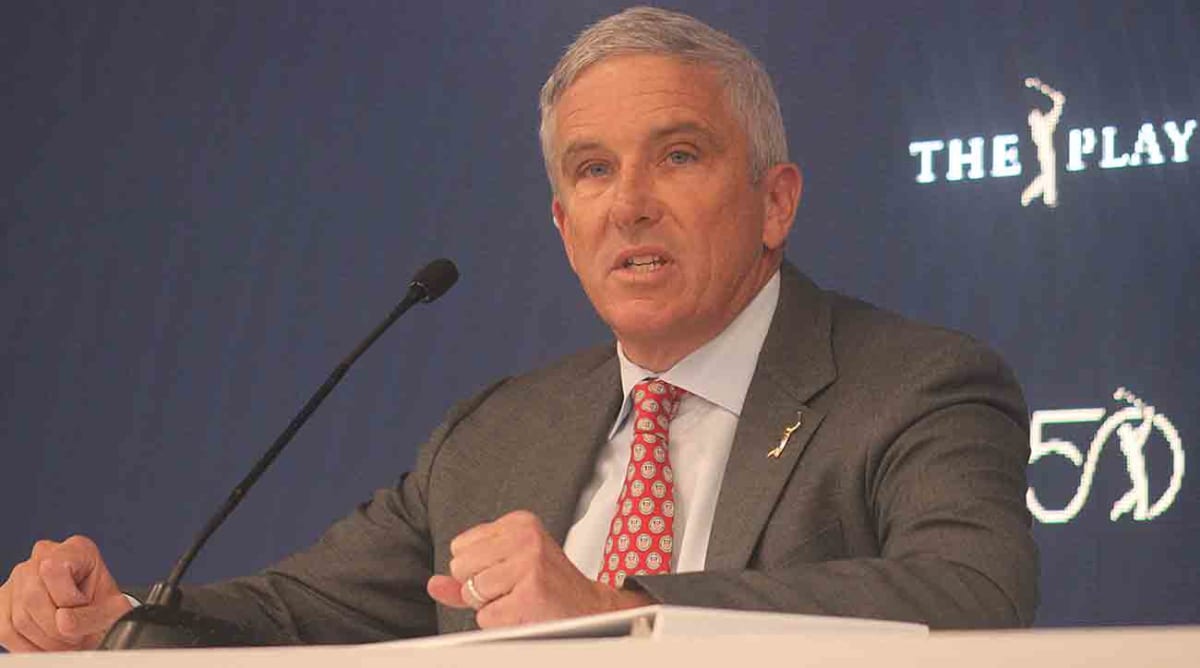PONTE VEDRA BEACH, Fla. — The word “fans” was used 24 times by Jay Monahan in his Tuesday press conference at the 50th Players Championship.
After listening to the PGA Tour commissioner for 59 minutes, you would believe fans are the Tour's most important constituency and that everyone here is committed to making the pro game better for them.
Monahan said early in his remarks that he wanted to speak directly to the fans and, in an apologetic tone, downplayed the discussions of money.
“All of this talk about investment and growth, I want you to know that we’re focusing that energy on bringing forth the most competitive and entertaining Tour possible for you,” Monahan said. “It’s my commitment and it’s our players’ commitment.”
But recent actions by the PGA Tour would seem to show that fans are getting the same amount of respect as middle-of-the-road Tour player—namely, their concerns may be heard, but what benefits are they receiving?

Clayton Freeman/Florida Times-Union
When you hear about an organization raising $3 billion from the Strategic Sports Group, with $930 million going to players across four categories including $750 million to 36 top players ... how exactly is this a fan-driven endeavor?
Can fans see themselves as a key constituency while multimillionaire golfers continue to add to their bank accounts at every turn?
Monahan confirmed that the first PGA Tour Policy Board meeting since SSG became an investor focused primarily on how current and future fans can be at the center of the decision-making.
“They love golf, and they're loyal to the PGA Tour,” Monahan said of what their fan research has concluded. “They're tired of hearing about conflict, money and who is getting what. They want to watch the world's best golfers compete in tournaments with history, meaning, and legacies on the line at venues they recognize and love.”
But is all this really about serving fans, or is it a way to generate more revenue for the players and its new investors?
Monahan says the goal is to make PGA Tour golf more entertaining and accessible for fans, with enhancements to include more golf shots in broadcasts, more data and analytics, more insights and innovations and better engagement in gaming.
Who pays for these enhancements?
Broadcasts would have to dedicate more time to live golf shots by either limiting their commercial time or going to a double-box look with commercials and golf. If it's the former, rights-holders will have to find additional money to offset the loss of advertising spots.
Yet when asked about additional revenue sources to pay SSG for their investments, Monahan answered with ... the networks.
“As we go forward, we think having the investment that we have from Strategic Sports Group, which allows us to invest back in new technologies, new data, new ways to present our sport, ultimately as we go forward, yes,” Monahan said. “I think that we'll be in a position to significantly and materially grow our media rights. Absolutely.”
The amount the Tour would invest and the return it would be looking at from that investment is unclear, but to offset the $3 billion investment from SSG by going to the same well seems fanciful at best.
And thinking that a large portion of that could come from broadcasters who are already cutting back on production costs to save money makes the idea even more absurd.
You can’t get blood from a stone.
“I think you’ve heard it from some guys over the last couple weeks ... just really trying to focus on getting the product back to serving the fans,” Patrick Cantlay said, continuing the fan-oriented theme. “I think that’s the most important thing is giving the fans what they want to see and giving the fans opportunities to see us, both on the course and then also behind the scenes.”
Cantlay, a smart and astute member of the Policy Board, was espousing the party line.
But ultimately the fans are merely currency, which the Tour wants to use to cash in for larger rights deals and more revenue from gambling.
Is there anything wrong with that? Don't other sports generate fan interest and then cash in on the popularity?
In the old days of the Tour, players played for peanuts and now they get paid millions for not jumping to LIV Golf.
Does it seem disingenuous for Monahan to complain about the poor treatment of the fans when he is a major player in creating the disenchantment?
Should fans feel used? Should they realize the Tour's focus on their needs is really for a larger reason, namely putting revenue in the Tour coffers?
If you need an example of the Tour's lack of candor, look no further than Monahan’s comments about charitable giving.
In his opening remarks Tuesday, the commissioner beat a familiar drum and mentioned the organization’s almost $4 billion in charitable giving—but failed to say how the majority of that money is raised locally by tournaments and not the Tour.
The tournaments are the stars, and the Tour continually takes credit for their efforts. Yet if you’re running a business, you need to find the best way to capture revenue and pay your bills.
With the SSG investment, that bill got a lot bigger and there is a pressing need for additional revenue, either through existing streams or new sources. That's the Tour’s immediate focus.
Monahan said Tuesday it's all about the fans. Don’t be surprised if they're the ones paying the PGA Tour’s increasing bills.







